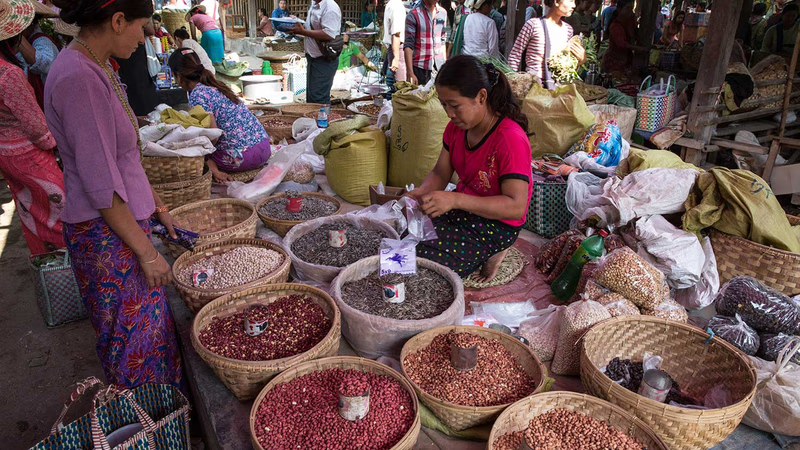
Myanmar, a Southeast Asian country rich in natural resources, has experienced varying levels of economic development due to political instability, military rule, and international sanctions. Its economy is primarily driven by agriculture, but there are significant contributions from mining, forestry, and natural gas sectors. The country is rich in minerals like jade, gemstones, and timber, which form the backbone of its exports. However, international sanctions, especially from Western countries, have limited its global trade interactions, including with the Middle East and West Asia.
The financial and banking systems in Myanmar have faced considerable challenges. Although reforms have been made since the early 2010s to modernize the banking sector, it remains underdeveloped compared to neighboring countries. The Central Bank of Myanmar oversees the monetary policy and is responsible for the issuance of its currency, the kyat (MMK). However, the country faces high inflation rates and currency instability. The banking sector is still highly state-controlled, and access to international banking systems is limited, which makes foreign trade and financial transactions complicated. The lack of a robust digital banking infrastructure and reliance on cash-based transactions has further hindered economic modernization.
Trade between Myanmar and the Middle East/West Asia, although not as extensive as with Southeast Asia or China, primarily revolves around energy and agricultural products. Myanmar exports products like rice, beans, and pulses to countries in the region, while importing petrochemical products, machinery, and electronics from Middle Eastern nations. Countries like the UAE and Qatar have also shown interest in investing in Myanmar’s growing energy sector, especially in oil and gas exploration, considering the country’s potential reserves. However, Myanmar`s economic relations with West Asian countries are still in their early stages, compared to its stronger connections with China, India, and Thailand.
Sanctions imposed due to political issues, such as the military coup in 2021, have made Myanmar’s trade with international markets more complex. While countries in the Middle East may not have imposed the same sanctions as Western nations, financial constraints and a lack of transparency in Myanmar’s governance and business practices create barriers. Nonetheless, its strategic location and abundant resources continue to make it a region of interest for foreign investment, especially as Myanmar looks to diversify its trade relationships beyond neighboring countries and attract investments from West Asia and the Middle East.
-
 O & J 2 months ago
O & J 2 months ago Myanmar
Myanmar Green jade stone
Myanmar
Myanmar Green jade stone
I want to sell Myanmar green jade stone. I live in Myanmar. Do you know Myanmar green jade, how beautiful and strong?Details
Myanmar"s recent economic data reveals a dynamic yet challenging trade environment. Between 2021 and 2023, Myanmar"s GDP fluctuated significantly, decreasing from $66. 3 billion in 2021 to $62. 2 billion in 2022, before rebounding to $66. 7 billion in 2023. This volatility contrasts with the global GDP trend, which rose steadily from $819 billion to $883 billion over the same period. The country"s GNI followed a similar pattern, indicating ongoing economic challenges. Trade indices provide further insight.
Myanmar’s merchandise import value index decreased from 79. 8 in 2021 to 94. 5 in 2023, suggesting a slow recovery compared to a global index that began at 124. 6 in 2021 and adjusted to 101. 1 by 2023. Meanwhile, the merchandise export value index in Myanmar dropped from 90. 8 to 86. 4, whereas the global average remained more stable, declining only slightly from 130.
3 to 102. 3. These figures indicate potential trade inefficiencies or external pressures on Myanmar"s export sector. Moreover, the official exchange rate of the Myanmar Kyat against the US dollar rose from 1,615 to 2,100 between 2021 and 2023, reflecting local currency depreciation. This trend contrasted sharply with the global average exchange rate increase from 608 to 697, underlining Myanmar"s particular susceptibility to currency volatility. Myanmar’s merchandise import volume saw a steady climb from 66. 2 in 2021 to an estimated 103. 7 in 2023, closing the gap with the global average, which increased from 107.
8 to 104. 5. This suggests a potential resurgence in demand that could benefit investors focusing on import-driven sectors. For businesses and investors, Myanmar presents both risks and opportunities. The ongoing economic fluctuations coupled with trade volume improvements highlight areas for strategic market entry. Aritral. com, a leading B2B platform, can aid businesses in navigating these complexities by offering AI-powered marketing and global sales assistance. Entrepreneurs are encouraged to establish profiles on Aritral.
com for enhanced visibility and market insights, particularly in West Asia’s diverse trade landscape. "

